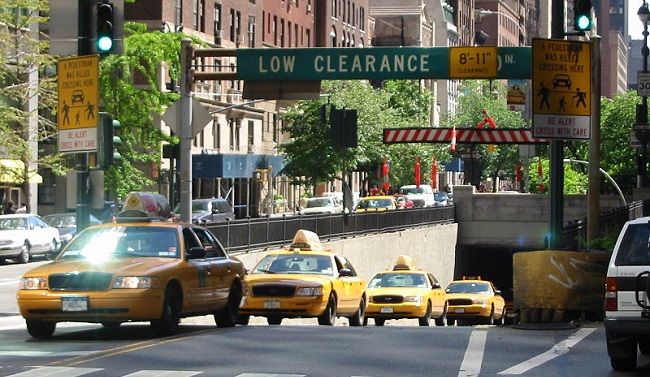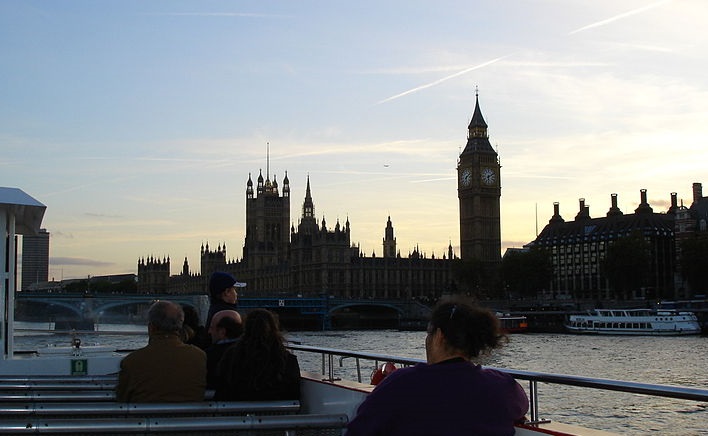The meters will start using GPS tech in order to boost their competition against Lyft and Uber.
A new pilot program is about to begin with the New York City Taxi and Limousine Commission in which it will be using geolocation technology within the fare meters in about 1,000 of its yellow cabs throughout the city.
The intention is also to take away the annoying “Taxi TVs” to replace them with a new type of payment system.
There are currently about 13,500 cabs in New York City that are reliant on a range of different devices that will track idle times and the number of times a wheel turns in order to help to calculate a fare. This system will be replaced in 1,000 of them as a part of a pilot program testing out geolocation technology based meters that will use GPS. In those cabs, the familiar red digits in the meters on the dashboards will be gone and a whole new system will have replaced them.
The length of the geolocation technology based meters is going to run for about a year and will be smaller than predicted.
 Initially, the plan had been to involve 4,000 cabs in the pilot, but that was reduced by a quarter. The cabs participating in this trial of the technology may also have a replacement of a number of other pieces of equipment including the TaxiTV, the credit card reader, the taximeter, and the vehicle location system, among other things. All of this will be replaced by a smartphone or tablet that will be used in order to calculate the fare as well as to collect the payment at the end of the trip.
Initially, the plan had been to involve 4,000 cabs in the pilot, but that was reduced by a quarter. The cabs participating in this trial of the technology may also have a replacement of a number of other pieces of equipment including the TaxiTV, the credit card reader, the taximeter, and the vehicle location system, among other things. All of this will be replaced by a smartphone or tablet that will be used in order to calculate the fare as well as to collect the payment at the end of the trip.
According to the commission’s chairperson, Meera Joshi, “Ultimately it is to create a more nimble system.” This pilot program has also been designed to help to upgrade the entire experience of taking a cab and is a direct response to the threat posed by app based ride share services such as Uber and Lyft.
There will be up to four companies that will be selected for participation in the geolocation technology using pilot program. Each of those companies will have the new mobile payment technology installed into 250 of its cabs.
If London Assembly member Tony Arbour has his way, mobile devices will be the key tool for tourists.
Conservative London Assembly member and mayoral hopeful, Tony Arbour, believes that there is a great deal to gain from the use of geolocation, QR codes and NFC technology when it comes to expanding the tourism in the city beyond the central area.
Many tourists miss out on some of the best features of the city because they never hear about them.
While Londoners would be able to tell you about the Horniman Museum, the Royal Air Force Museum, Crystal Palace Dinosaurs, and Richmond Park, many tourists are still visiting the core points of interest such as Buckingham Palace and the Tower of London. Essentially, tourists are missing out on some fantastic attractions and those attractions are missing out on the tourists. Arbour feels that if iBeacons using geolocation technology are combined with the use of QR codes, this problem can be rapidly resolved.
The key would be to use a Visit London mobile app which provides relevant information through geolocation tech.
 In order to use it, visitors would simply need to load the app. Then, whenever they travel near iBeacons throughout the city, they would receive information that is relevant to where they are so that they will be more aware of the types of attractions and points of interest that they could be visiting but that they might otherwise have missed.
In order to use it, visitors would simply need to load the app. Then, whenever they travel near iBeacons throughout the city, they would receive information that is relevant to where they are so that they will be more aware of the types of attractions and points of interest that they could be visiting but that they might otherwise have missed.
This will help them to see more than just inner London and to experience a great deal more of the city. It will also help the economic benefits of that tourism to spread outward toward other boroughs of the city.
Arbour has created a report that he has entitled “Unknown London”. He is hoping that Visit London, the tourist agency of the city, will change its current priorities and will use geolocation, QR codes, and other technologies to spread the benefits of tourism to new regions of London. As an example of the way it would work, he stated that “…a tour of London food markets could guide the tourist, via a series of codes or beacons, from one market to another, giving the history of each market, providing up to date vouchers and local dining and of course providing advice transport advice to the next stop on the route.”
 Initially, the plan had been to involve 4,000 cabs in the pilot, but that was reduced by a quarter. The cabs participating in this trial of the technology may also have a replacement of a number of other pieces of equipment including the TaxiTV, the credit card reader, the taximeter, and the vehicle location system, among other things. All of this will be replaced by a smartphone or tablet that will be used in order to calculate the fare as well as to collect the payment at the end of the trip.
Initially, the plan had been to involve 4,000 cabs in the pilot, but that was reduced by a quarter. The cabs participating in this trial of the technology may also have a replacement of a number of other pieces of equipment including the TaxiTV, the credit card reader, the taximeter, and the vehicle location system, among other things. All of this will be replaced by a smartphone or tablet that will be used in order to calculate the fare as well as to collect the payment at the end of the trip.
 In order to use it, visitors would simply need to load the app. Then, whenever they travel near iBeacons throughout the city, they would receive information that is relevant to where they are so that they will be more aware of the types of attractions and points of interest that they could be visiting but that they might otherwise have missed.
In order to use it, visitors would simply need to load the app. Then, whenever they travel near iBeacons throughout the city, they would receive information that is relevant to where they are so that they will be more aware of the types of attractions and points of interest that they could be visiting but that they might otherwise have missed.